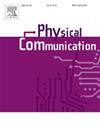Cooperative terahertz quantum key distribution: Secret key rate analysis and optimization
IF 2
4区 计算机科学
Q3 ENGINEERING, ELECTRICAL & ELECTRONIC
引用次数: 0
Abstract
In the recent years, there has been a growing interest in quantum key distribution (QKD) as a promising alternative to conventional cryptographic methods. QKD offers potential for ensuring absolute security in communication networks, leveraging the principles of quantum mechanics. This study diverges from previous research by investigating a cooperative continuous variable QKD (CVQKD) system operating at terahertz (THz) frequencies with multiple input multiple output (MIMO) technology, wherein the source and destination are assisted by a trusted decode-and-forward (DF) relay. Our focus lies on evaluating the secret key rate (SKR) of this system under direct reconciliation conditions and subsequently optimizing power and relay location to maximize the SKR. We address the practical concern of potential eavesdropping between the relay and the destination. Specifically, our analysis centers on the SKR performance of the coherent state-based CVQKD protocol under direct reconciliation conditions. Through numerical simulations, we demonstrate the significant enhancement in SKR achievable through optimization in the cooperative QKD system, yielding several noteworthy insights.
协同太赫兹量子密钥分配:密钥速率分析与优化
近年来,人们对量子密钥分发(QKD)越来越感兴趣,认为它是传统密码方法的一种有前途的替代方案。利用量子力学原理,量子密钥分配为确保通信网络的绝对安全提供了潜力。本研究不同于以往的研究,研究了一种在太赫兹(THz)频率下使用多输入多输出(MIMO)技术的合作连续变量QKD (CVQKD)系统,其中源和目标由可信的解码转发(DF)中继辅助。我们的重点是评估该系统在直接对调条件下的密钥速率(SKR),然后优化功率和继电器位置以最大化SKR。我们解决了中继和目的地之间潜在窃听的实际问题。具体来说,我们的分析集中在直接对调条件下基于相干状态的CVQKD协议的SKR性能上。通过数值模拟,我们证明了通过优化合作QKD系统可以实现SKR的显着增强,并产生了一些值得注意的见解。
本文章由计算机程序翻译,如有差异,请以英文原文为准。
求助全文
约1分钟内获得全文
求助全文
来源期刊

Physical Communication
ENGINEERING, ELECTRICAL & ELECTRONICTELECO-TELECOMMUNICATIONS
CiteScore
5.00
自引率
9.10%
发文量
212
审稿时长
55 days
期刊介绍:
PHYCOM: Physical Communication is an international and archival journal providing complete coverage of all topics of interest to those involved in all aspects of physical layer communications. Theoretical research contributions presenting new techniques, concepts or analyses, applied contributions reporting on experiences and experiments, and tutorials are published.
Topics of interest include but are not limited to:
Physical layer issues of Wireless Local Area Networks, WiMAX, Wireless Mesh Networks, Sensor and Ad Hoc Networks, PCS Systems; Radio access protocols and algorithms for the physical layer; Spread Spectrum Communications; Channel Modeling; Detection and Estimation; Modulation and Coding; Multiplexing and Carrier Techniques; Broadband Wireless Communications; Wireless Personal Communications; Multi-user Detection; Signal Separation and Interference rejection: Multimedia Communications over Wireless; DSP Applications to Wireless Systems; Experimental and Prototype Results; Multiple Access Techniques; Space-time Processing; Synchronization Techniques; Error Control Techniques; Cryptography; Software Radios; Tracking; Resource Allocation and Inference Management; Multi-rate and Multi-carrier Communications; Cross layer Design and Optimization; Propagation and Channel Characterization; OFDM Systems; MIMO Systems; Ultra-Wideband Communications; Cognitive Radio System Architectures; Platforms and Hardware Implementations for the Support of Cognitive, Radio Systems; Cognitive Radio Resource Management and Dynamic Spectrum Sharing.
 求助内容:
求助内容: 应助结果提醒方式:
应助结果提醒方式:


